Camping in Uganda: A guide to the Pearl of Africa’s outdoor bliss
The Pearl of Africa, Uganda is a fusion of biodiversity, cultural and adventure that has enough highlights to make you visit again and again. Whether in the whispering forests of Bwindi, or the roaring Nile at Jinja, camping in Uganda is more than a pleasure, but an adventure in the wild natural beauty, culture and the regulations governing it.
This time we are not just going to consider the legendary campsites, but also the convenient and legal regulations defining what is safe and what is respectful to sleep under the stars. Whether it is pitching a tent in the heart of the bush under the stars at Murchison Falls or sleeping by the serene shores of Lake Victoria, the Uganda landscape will match the rustic adventurer and glampers alike. The secret is to learn how to do it right, ethically, legally and responsibly.
- The geography and climate of Uganda for campers
- Topographical zones ideal for camping
- Best camping sites in Uganda: Curated experiences
- Camping in Jinja: The adventure capital basecamp
- Explorers river camp Jinja: A riverside icon
- Camping sites in Entebbe: Lakeside leisure
- Camping sites in Kampala: Urban escape
- Camping sites in Mukono: Forested retreats near the city
- Solo vs group camping
- Conclusion: A legal, memorable outdoor experience in Uganda
- Frequently Asked Questions about Camping in Uganda
- Do I need special permission to camp on private land in Uganda?
- Is wild camping allowed in Uganda?
- Are campfires allowed at campsites in Uganda?
- Is it safe to camp in Uganda without a guide?
- What type of tent works best for Uganda’s climate?
- Can I camp during Uganda’s rainy season?
- Are there quiet hours at campsites in Uganda?
- Is electricity available at most campsites?
- Can I camp in Uganda with children?
- What should I do if I encounter wildlife near my campsite?
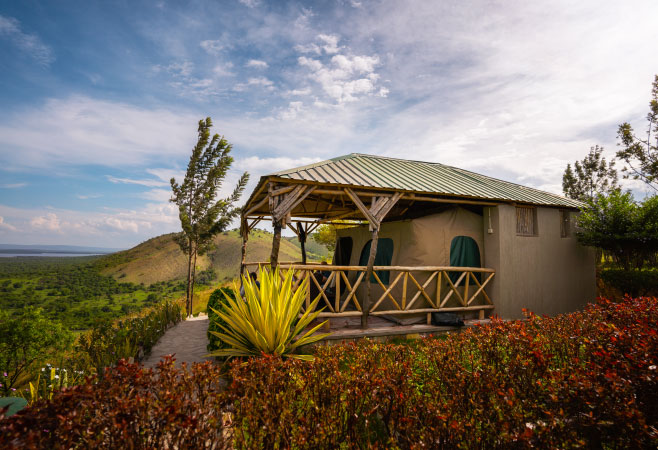
Lodge with a beautiful view in Lake Mburo National Park in Uganda
The geography and climate of Uganda for campers
Uganda’s equatorial location blesses it with a mild and hospitable climate year-round. Its diverse landscape ranges from the snow-capped Rwenzori Mountains to lush rainforests, open savannahs and freshwater lakes.
The dry seasons (December - February and June - August) are ideal for camping, offering clear skies and accessible roads. During the rainy seasons, however, trails become muddy and some campsites may be flooded - especially in low-lying regions like the Albertine Rift.
Highland areas such as Kabale and Fort Portal provide cooler temperatures and are perfect for forest camping, while lowland parks like Kidepo and Murchison Falls offer warmer, safari-style camping experiences. Campers must prepare for rapid weather changes, especially in mountainous zones.
Topographical zones ideal for camping
Uganda’s diverse landscapes provide a huge canvas for all types of campers to explore. Each geographic area provides different opportunities and constraints, regulated by different ecological and legal conditions. Whether you’re climbing mountains, a water child or love to explore savannas, Uganda offers a customized experience.
- Highlands and mountain zones
The Rwenzori Mountains and Mount Elgon are UNESCO-recognized ecosystems. Camping here is best for trekkers and climbers, with high-altitude base camps legally supervised by the Uganda Wildlife Authority. Permits are mandatory due to the ecological sensitivity and to ensure ranger support for hikers. With misty peaks and alpine vegetation, this is ideal for cooler-season campers.
- Savannah and woodland
Regions like Queen Elizabeth National Park and Kidepo Valley represent Uganda’s classic safari terrain. These areas offer well-managed bush campsites, often with sweeping views of wildlife. You’ll need a UWA permit and rangers may accompany you at night due to animal activity. The legal framework emphasizes minimal environmental intrusion and strict fire-control policies.
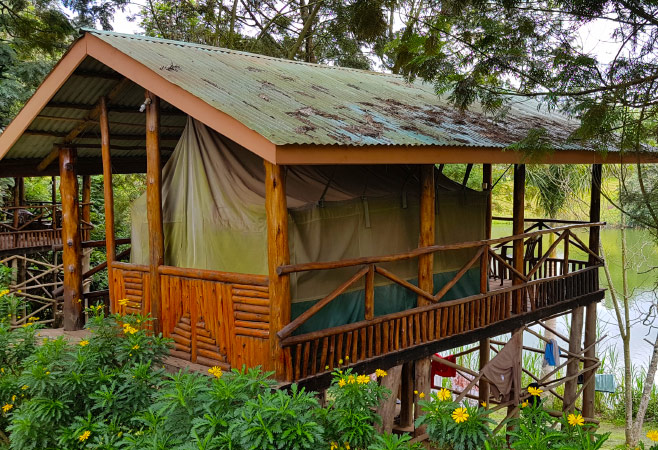
House on the hills, Bunyonyi Lake, Western Uganda
- Lakeshores and wetlands
Areas along Lake Victoria, Lake Bunyonyi and the Nile River feature open grasslands and papyrus swamps. Here, camping sites balance leisure and regulation. Boating laws, fishing rights and ecological protection under NEMA (National Environment Management Authority) apply. Ideal for peaceful retreats, birding and water sports.
- Tropical rainforests and reserves
Bwindi’s dense forests are better explored from nearby lodges or camps just outside park boundaries, as camping inside the park is generally restricted due to conservation rules and wildlife safety. You’re in gorilla and chimpanzee country, so camping is regulated tightly. Permits, trained guides and ethical engagement are non-negotiable. NFA guidelines also cover campfire restrictions, waste management and eco-lodging alternatives.
Best camping sites in Uganda: Curated experiences
Let’s break down Uganda’s top campsites across various regions for a more localized perspective:
| Region | Top campsites | Highlights |
| Jinja | Explorers River Camp, Nile River Camp | White-water rafting, river views, Basecamp Jinja amenities |
| Entebbe | UWEC Campgrounds, Entebbe Backpackers | Lakeside camping, airport access, wildlife |
| Kampala | Red Chilli Hideaway, Cassia Lodge Camps | Urban escape, views of Lake Victoria |
| Mukono | Forest Park Resort, Sezibwa Falls Camping | Forest vibes, waterfalls, ziplining |
| Murchison | Red Chilli Rest Camp, Delta Camp | Safari base, Nile views, close to waterfalls |
| Queen Elizabeth | Mweya Campground, Bush Lodge | Wildlife corridor, birding, Kazinga Channel access |
| Fort Portal | Kibale Forest Camp, Crater Safari Lodge | Primates, crater lakes, dense forest |
| Lake Bunyonyi | Byoona Amagara Island Retreat | Island camping, dugout canoeing, serene views |
| Kidepo | Apoka Rest Camp | Remote, wildest bush experience, tribal culture |
Each campsite operates under specific regulations, including daily entry fees, waste disposal codes and wildlife proximity laws. Advance bookings are strongly recommended, as capacity in Kidepo campsites is very limited
Camping in Jinja: The adventure capital basecamp
If there’s one location that embodies the thrill of camping in Uganda, it’s Jinja. Known as East Africa’s adrenaline hub, Jinja sits where the Nile River exits Lake Victoria. For campers, this means stunning riverbank sunrises, abundant activities and well-regulated campgrounds.
Jinja’s zoning allows both private and public campgrounds. Legal requirements are lighter here than in national parks, but local council regulations on noise, sanitation and safety still apply. Booking through registered providers ensures compliance.
Activities include:
- White-water rafting (legal only through certified operators)
- Kayaking and tubing (lifejackets mandatory)
- Quad biking and horseback safaris
- Bungee jumping (subject to safety audits)
Basecamp Jinja and Explorers River Camp are two iconic spots. Their legal status is well-established, offering valid business licenses, full sanitation facilities and secure parking.
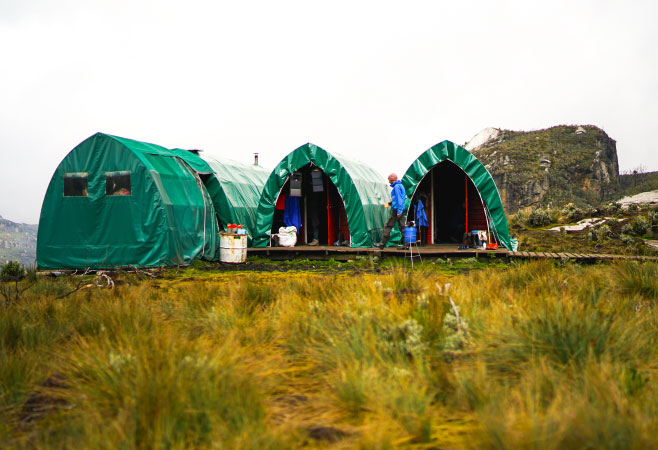
Bugata Camp in the Rwenzori Mountains
Explorers river camp Jinja: A riverside icon
As one of the most trusted names in Ugandan outdoor accommodation, Explorers River Camp Jinja delivers a full-package camping experience with compliance and safety as its backbone.
Facilities and features:
- Riverside pitches with views of the Nile
- Clean toilets and hot showers
- Barbecue grills and restaurant
- 24/7 security and emergency access
- Local tour desk (NRA certified)
Their booking system is transparent - visitors must present a national ID/passport, sign a liability waiver and agree to a “leave no trace” code of conduct. Rangers routinely patrol this stretch to enforce riverbank laws, especially during festival seasons.
Camping sites in Entebbe: Lakeside leisure
Nestled along the shores of Lake Victoria, Entebbe offers a peaceful alternative to inland camps. Ideal for first-time campers, families or layover tourists, Entebbe camping is characterized by calm waters, birdwatching and accessible amenities.
Top picks:
- UWEC (Uganda Wildlife Education Centre) Campsites
- Entebbe Backpackers Lodge
- Nabinonya Beach Camp
These sites operate under NEMA regulations, particularly around lakefront zoning. Swimming is allowed only in marked areas due to bilharzia risks and fishing rights.
Camping sites in Kampala: Urban escape
Who says camping can’t coexist with city life? Camping sites in Kampala offer unique escapes without leaving the capital. These spots are often eco-lodges with legal camping licenses, providing a budget-friendly retreat from the urban bustle. Many "campsites" in Kampala are actually lodges offering space for camping rather than dedicated wilderness campsites.
Recommended camps:
- Red Chilli Hideaway: Located in Butabika with secure tent grounds.
- Cassia Lodge Camping: Elevated views and high-end amenities.
KCCA (Kampala Capital City Authority) requires that private campsites meet public health standards, including potable water and waste collection. Firewood collection is restricted and campers are encouraged to bring their own supplies or use gas.
Camping sites in Mukono: Forested retreats near the city
Located just an hour’s drive from Kampala, Mukono provides an enchanting blend of forest, lake and cultural richness - making it an increasingly popular destination for nature-based tourism and eco-camping. Unlike the bustling capital, Mukono’s ambiance is quiet and deeply connected to the traditional Baganda heritage, offering legal yet immersive outdoor experiences.
Top camping spots in Mukono:
- Forest Park Resort: Located near Kisoga, this resort provides elevated forest huts, tent pitches, zip-lining and birding walks. It holds an environmental compliance certificate from NEMA.
- Sezibwa Falls Camping Site: Adjacent to a cultural heritage site, this location requires coordination between Buganda Kingdom cultural offices and UWA for environmental permits. Sezibwa Falls Camping Site offers cultural storytelling sessions around a campfire - fire use regulated by local ordinances.
These campsites often lie on customary land, requiring negotiations with local council representatives and land custodians for legal access. Foreigners are advised to book through registered tour operators to ensure documentation and insurance coverage. Use of drone photography, for example, is prohibited without clearance from Uganda Civil Aviation Authority (UCAA).
Amenities & access:
- Public pit latrines and mobile toilets are common.
- Fire use requires portable fire pits.
- Waste disposal facilities must be used or taken back.
Mukono is a safe, family-friendly area ideal for beginner campers or those seeking a weekend escape. The district’s progressive land-use policies encourage low-impact tourism, provided guidelines are followed strictly.
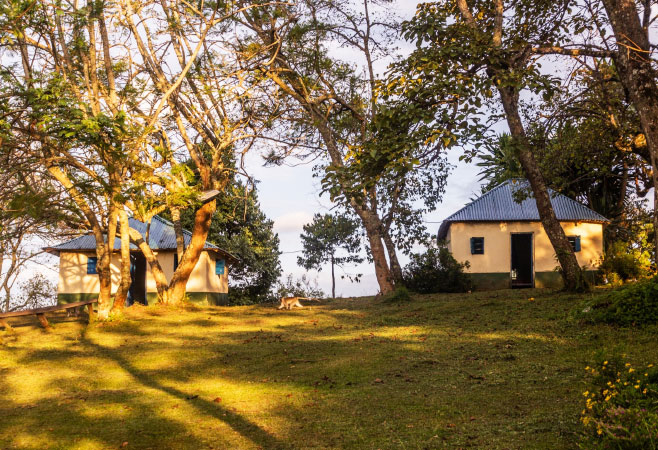
Hut of a campsite near Nkuruba lake near Fort Portal, Uganda
National Parks Offering Campsites: Rules and must-knows
Uganda boasts 10 national parks, most of which include designated campsites under the management of the Uganda Wildlife Authority (UWA). These parks are legally protected under the Uganda Wildlife Act and violations - such as unauthorized camping, feeding wildlife or damaging flora - are punishable by fines or imprisonment.
Key parks with camping facilities:
| National park | Popular campsites | Wildlife access |
| Murchison Falls | Delta Camp, Red Chilli Rest Camp | Lions, elephants, hippos |
| Queen Elizabeth | Mweya Campground, Ishasha Wilderness | Tree-climbing lions, leopards |
| Bwindi Impenetrable Forest | Buhoma Rest Camp, Rushaga Camp | Gorillas, monkeys |
| Lake Mburo | Rwonyo Rest Camp | Zebras, impalas, elands |
| Kidepo Valley | Apoka Rest Camp | Ostriches, cheetahs |
Legal requirements for park camping:
- Park entry permit: All visitors must pay a daily entrance fee (~$40 for foreigners, ~$10 for locals).
- Camping fees: In basic sites range from UGX 15,000 - UGX 50,000 per night. Luxury glamping experiences may cost significantly more.
- Ranger escort: Required for areas with high wildlife activity.
- No firearms or hunting: Strict zero-tolerance policy.
- Guided walks only: Especially in gorilla zones like Bwindi.
Note: Check the latest UWA fee schedule before travel, as prices are subject to change.
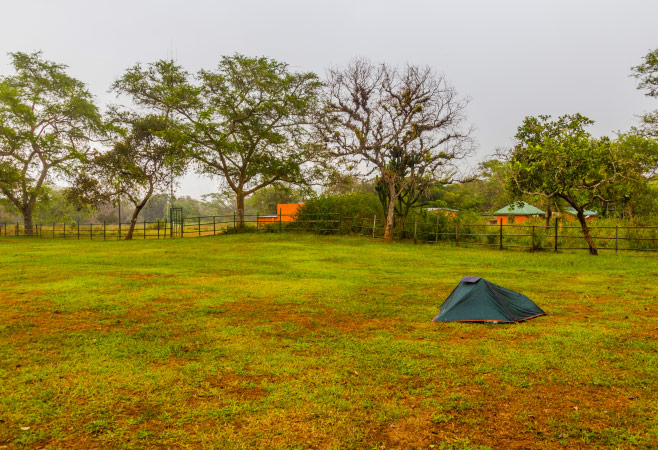
Camping site in Ziwa Rhino Sanctuary, Uganda
Solo vs group camping
Both solo and group camping in Uganda offer unique experiences, but each has distinct legal implications and safety considerations.
Solo camping:
Pros:
- Flexibility and introspection
- Easier to move and pack light
Cons:
- Increased risk in remote areas
- Restricted in wildlife parks - UWA often requires ranger accompaniment
Legal note: Solo camping in national parks may be denied if rangers believe it poses a safety threat. The Wildlife Act mandates that visitors in dangerous zones must be escorted.
Group camping:
Pros:
- Shared resources (tents, cooking supplies)
- Increased safety and social interaction
- Discounts for group bookings at some campsites
Cons:
- Requires more coordination and space
- Higher noise levels may disrupt wildlife
For both styles, it's essential to register your presence with authorities - especially in remote or border regions like Kidepo Valley. Always carry a satellite phone or radio in areas with poor mobile coverage.
Notes: At night in parks, never leave tents alone and avoid storing food inside tents, as it attracts wildlife such as hyenas, elephants, or even lions.
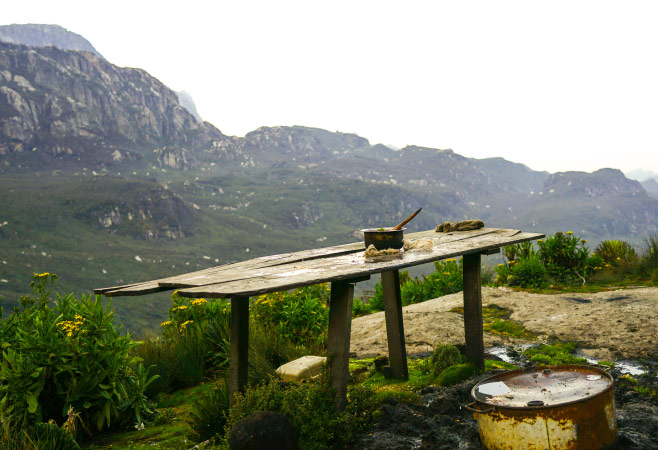
Beautiful landscape in Rwenzori Mountains at Uganda
Conclusion: A legal, memorable outdoor experience in Uganda
Uganda camping is much more than a fun retreat, it is an internal journey back to the pristine wilderness, ancient cultures and sacred ecosystems of Africa. With preparation, respect and legal responsibility, it turns out to be a memorable experience into the depth of nature.
Camping in Uganda is something special, whether it is pitching a tent beside the roaring Nile in Jinja, trekking through gorilla country in Bwindi or bathing in the silence of the islands of Lake Bunyonyi, you can find a place in Uganda to camp in peace, in purpose and in harmony with the land.
The secret though? Knowledge. Knowing the regulations, acquiring the permits, treating the communities and being a sensible eco-traveller. By doing so, you will not only protect yourself but will also help in long-term conservation and community development of Uganda.
Frequently Asked Questions about Camping in Uganda
Do I need special permission to camp on private land in Uganda?
Yes. Camping on private or customary land requires permission from the landowner or local council authorities. Verbal consent is common in rural areas, but tourists are strongly advised to go through registered campsites or tour operators to avoid awkward misunderstandings—or sudden late-night visits from curious neighbors.
Is wild camping allowed in Uganda?
Wild camping is generally discouraged and often illegal, especially inside national parks, forest reserves, or near border areas. Uganda prioritizes conservation and safety, so designated campsites are the safest and most lawful option. Think of it as camping with rules, not camping with rebels.
Are campfires allowed at campsites in Uganda?
Campfires are allowed only in designated fire pits and may be restricted during dry seasons. Collecting firewood from parks or forests is prohibited. Most campsites provide firewood or encourage gas stoves—because nothing ruins a trip faster than accidentally starting a savannah barbecue.
Is it safe to camp in Uganda without a guide?
In urban and semi-urban campsites like Jinja, Entebbe, or Mukono, camping without a guide is generally safe. However, in national parks and remote regions, guides or ranger escorts are often mandatory. Wildlife doesn’t follow Google Maps, so local expertise matters.
What type of tent works best for Uganda’s climate?
A waterproof, well-ventilated tent with a mosquito net is ideal. Uganda’s weather can change quickly, and insects are very enthusiastic guests. A good tent keeps rain out and bugs politely outside where they belong.
Can I camp during Uganda’s rainy season?
Yes, but with caution. Rainy seasons offer lush scenery and fewer crowds, but muddy roads and limited access to remote campsites can be challenging. It’s camping with a sense of adventure—and possibly very muddy shoes.
Are there quiet hours at campsites in Uganda?
Most campsites enforce quiet hours, typically from 10:00 PM onward. This helps protect wildlife and ensures everyone enjoys the peaceful atmosphere. Nature provides enough sound effects—no need for midnight karaoke.
Is electricity available at most campsites?
Some campsites offer solar power or limited charging stations, but many operate off-grid. Power banks are highly recommended. After all, sunsets look better when you’re not panicking about a dead phone.
Can I camp in Uganda with children?
Yes, many campsites are family-friendly, especially in Entebbe, Lake Bunyonyi, and Jinja. Parents should choose fenced campsites with proper sanitation and avoid unfenced wilderness areas. Adventure is great—peace of mind is better.
What should I do if I encounter wildlife near my campsite?
Stay calm, remain inside your tent, and follow campsite or ranger instructions. Never attempt to approach or feed animals. Wildlife encounters are exciting—but they are best enjoyed from a respectful distance, preferably zipped inside a tent.
Related Articles
- Entebbe Botanical Gardens Entrance Fee to Uganda’s Green Paradise
- Uganda Reptile Village: Where the Wild Side of Nature Gets Scaly
- Ngamba Island Chimpanzee Sanctuary: Uganda’s Primate Paradise
- Uganda Wildlife Conservation Education Centre: Where Learning Meets Adventure
- Pearl Crafts Village Uganda: A Colorful Stop You Shouldn’t Miss
- Mabamba Swamp Bird Watching: A Wild Adventure You’ll Never Forget
- Hot Air Balloon in Uganda: Best safari locations & tips for tourists
- Budongo Forest in Uganda: Chimpanzee trekking guide
- Ngamba Island Chimpanzee Sanctuary: Top wildlife experience
- Accommodation in Uganda: Best hotels, lodges, campsites











